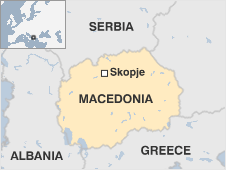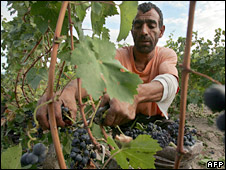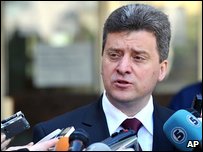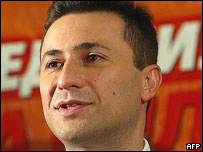 |
Macedonia was spared the inter-ethnic violence that raged elsewhere in the Balkans following the break-up of Yugoslavia in the early 1990s but it came close to civil war a decade after independence.
Rebels staged an uprising in early 2001 demanding greater rights for the ethnic Albanian minority. The conflict created a wave of refugees and the rebels made territorial gains.
Overview
After months of skirmishes EU and Nato support enabled the president Boris Trajkovski to strike a peace deal. Under the Ohrid agreement Albanian fighters laid down their arms in return for greater ethnic-Albanian recognition within a unitary state.

Macedonia is a candidate for membership of the EU
|
Acknowledgement of ethnic-Albanian rights was formalised in amendments to the constitution approved by parliament in late 2001. Ethnic Albanians account for about a quarter of the population.
In August 2004 parliament approved legislation redrawing local boundaries and giving ethnic Albanians greater local autonomy in areas where they predominate.
Recognition of the republic's progress from the brink of civil war came in December 2005 when the EU leaders agreed that it should become a candidate for membership. The EU has urged Macedonia to crack down on corruption ahead of accession talks.
The country's name remains a contentious issue. It is still referred to formally as the Former Yugoslav Republic of Macedonia (FYROM).
International recognition of the country's split from Yugoslavia in 1991 was held up over Greek fears that its name implied territorial ambitions toward the northern Greek region of Macedonia. Greece lifted a two-year trade blockade only after the two countries signed an accord in 1995.
And in 2008 Nato leaders agreed to invite Albania and Croatia to join the alliance. But Greece blocked Macedonia's invitation because of the dispute over the country's name.
In December 2008 Macedonia decided to take the issue of its name to the International Court of Justice in the Hague.
Facts
- Full name: Republic of Macedonia (listed by the UN as The former Yugoslav Republic of Macedonia)
- Population: 2 million (UN 2009)
- Capital: Skopje
- Area: 25713 sq km (9928 sq miles)
- Major language: Macedonian Albanian
- Major religion: Christianity Islam
- Life expectancy: 72 years (men) 77 years (women) (UN)
- Monetary unit: 1 denar = 100 deni
- Main exports: Clothing iron and steel
- GNI per capita: US $4140 (World Bank 2008)
- Internet domain: .mk
- International dialling code: +389
Leaders
President-elect: Gjorge Ivanov

Resolving Macedonia's dispute with Greece will be Mr Ivanov's priority
|
The academic political scientist Gjorge Ivanov was chosen as presidential candidate by the conservative VMRO-DPMNE party the largest in parliament.
He led in the first round of voting in March 2009 with 35 per cent of votes cast. The Social Democrats' candidate Ljubomir Frckoski came second with 20 per cent. Mr Ivanov beat Mr Frckoski comfortably in the second round in April with 63 per cent of the vote and is due to take office as president on 12 May.
During the campaign Mr Ivanov said he would make resolving Macedonia's long-standing dispute with Greece his priority and would seek a meeting with the President of Greece to that end.
Born in 1960 Mr Ivanov is married with two children.
His predecessor Social Democrat Branko Crvenkovski who was elected president in April 2004 won praise in the West for supporting reconciliation with the substantial Albanian minority.
Macedonia's presidents are directly elected for a five-year term. The president appoints the prime minister. Legislative power is vested in parliament.
Prime minister: Nikola Gruevski

Nikola Gruevski insists country's name will not be changed
|
Nikola Gruevski leader of the centre-right VMRO-DPMNE was first asked to form a government after elections in July 2006. The outgoing coalition was led by the Social Democrats.
The 2006 poll was seen as a test of the Ohrid peace deal that ended an ethnic Albanian uprising in 2001 and there was relief when it passed off relatively peacefully.
The prime minister's party won 44 seats in the 120-seat parliament and went on to gain a majority in parliament through a deal with the Democratic Party of Albanians and three small parties.
Mr Gruevski called fresh elections in 2008 after Macedonia's Nato entry was blocked by Greece. His party won the elections comfortably though complaints of irregularities led to re-runs in ethnic Albanian areas.
His main priorities have been tackling corruption and organised crime and fostering economic revival and job creation. He is keen to see Macedonia join the EU as soon as possible.
The prime minister is a former World Bank economist amateur boxer and stage actor.
Media
The constitution guarantees freedom of speech and access to information. Public TV which has three national channels faces stiff competition from private networks.
Media outlets are strongly divided along ethnic lines US-based Freedom House reported in 2008.
Commercial TV dominates the ratings a 2008 EU-sponsored report said describing the broadcasting market as overcrowded with more than 100 TV and radio stations. Most local broadcasters were "barely surviving" financially.
But the report said parliament had adopted "progressive" media legislation bringing the country into line with European standards.
There were around 900000 internet users by July 2008 around 44 per cent of the population (Internetworldstats).
The press
- Nova Makedonija - state-subsidised daily
- Utrinski Vesnik - private daily
- Dnevnik - private daily
- Vreme - private daily
- Vecer - state-subsidised daily
- Makedonija Denes - private daily
- Vest - private daily
- Fakti - Albanian-language
- Forum - weekly
- Aktuel - private news weekly
- Focus - private weekly
- Start - political weekly
Television
- MTV - state-owned operates three national networks and satellite network
- A1 - private national
- Sitel TV - private national
- Kanal 5 - private
Radio
- Macedonian Radio - state-owned
- Kanal 77 - private national
- Antenna 5 - private national
- Metropolis Radio - private national
News agencies
- Makfax - private English-language pages
-
Macedonian Information Agency (MIA) - state-run English-language pages
AFRICA | ASIA-PACIFIC | AMERICAS | EUROPE | MIDDLEEAST | SOUTHASIA
Mauritania Mauritius Morocco Mozambique Namibia Niger Nigeria Republic-of-congo Rwanda Sao-tome-and-principe Senegal Seychelles Sierra-leone Somalia South-africa Sudan Swaziland Tanzania The-gambia Togo Tunisia Uganda zambia Zimbabwe Australia Brunei Burma Cambodia China East-timor Fiji Indonesia Japan Kazakhstan Kiribati Kyrgyzstan Laos Malaysia Marshall-islands Micronesia Mongolia Nauru New-zealand North-korea Palau Papua-new-guinea Samoa Singapore Solomon-islands South-korea Taiwan Tajikistan Thailand The-philippines Tonga Turkmenistan Tuvalu Uzbekistan Vanuatu Vietnam Antigua-and-barbuda Argentina Bahamas Barbados Belize Bolivia Brazil Canada Chile Colombia Costa-rica Cuba Dominica Dominican-republic Ecuador El-salvador Grenada Guatemala GuyanaHaiti Honduras Jamaica Mexico Nicaragua Panama Paraguay Peru St-kitts-and-nevis St-lucia St-vincent-and-the-grenadines Suriname Trinidad-and-tobago United-states-of-america Uruguay Venezuela Albania Andorra Armenia Austria Azerbaijan Belarus Belgium Bosnia-hercegovina Bulgaria Croatia Cyprus Czech-republic Denmark Estonia Finland France Georgia Germany Greece Hungary Iceland Ireland Italy Latvia Liechtenstein Lithuania Luxembourg Macedonia Malta Moldova Monaco Montenegro Norway Poland Portugal Russia San-marino Serbia Slovakia Slovenia Spain Sweden Switzerland The-netherlands Turkey Ukraine United-kingdom Vatican Algeria Egypt Iran Iraq Israel-and-palestinian-territories Jordan Kuwait Lebanon Libya Mauritania Oman Saudi-arabia Sudan Syria Tunisia United-arab-emirates Yemen Afghanistan Bangladesh Bhutan India Nepal Pakistan Sri-Lanka The-Maldives

